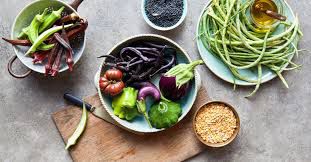ARTICLES
Low-Sodium Diet Tips for Heart Patients
Low-Sodium Diet Tips for Heart Patients

A healthy heart thrives on balance, and sodium plays a big role in tipping that balance. For those with heart conditions, managing sodium intake is one of the most effective ways to ease pressure on the cardiovascular system. Excess sodium causes the body to retain water, raising blood pressure and straining the heart. Lowering sodium intake can improve symptoms and reduce the risk of complications.
While cutting back on salt can feel challenging, adopting simple habits can make a low-sodium diet both enjoyable and sustainable.
1. Cook at Home More Often
Home cooking lets you control how much salt goes into each dish. Use fresh ingredients instead of processed or canned foods, which often contain hidden sodium. Experiment with herbs, spices, lemon juice, and vinegar to add flavor without salt.
2. Read Food Labels Carefully
Sodium can hide in unexpected places like bread, sauces, and snacks. Learn to read nutrition labels and choose products labeled “low sodium,” “no salt added,” or “reduced sodium.” Keep in mind that “low sodium” means 140 mg or less per serving.
3. Limit Processed and Packaged Foods
Foods like deli meats, frozen meals, canned soups, and snack foods are typically high in sodium. Opt for fresh or frozen vegetables without added sauces, and choose fresh meats over processed options. Preparing meals from scratch helps keep sodium in check.
4. Rinse Canned Foods Thoroughly
If using canned beans or vegetables, rinse them under water before cooking or eating. This simple step removes a large portion of the sodium that is added during processing.
5. Cut Back on Condiments and Sauces
Soy sauce, ketchup, salad dressings, and marinades can be surprisingly high in sodium. Use them sparingly or try homemade versions using fresh ingredients. For example, blend fresh herbs with olive oil and vinegar for salad dressing.
ALSO READ: 12 Ways People Commit Abortion but Will Never Admit
6. Choose Fresh or Frozen Herbs and Spices
Herbs and spices add flavor complexity without sodium. Fresh basil, cilantro, rosemary, and thyme can brighten dishes. Spices like paprika, cumin, turmeric, and black pepper bring warmth and depth.
7. Avoid Salt at the Table
Many people add salt automatically before tasting. Try to break this habit by seasoning food with other flavors first. If needed, add a small pinch only after tasting.
ALSO READ: Natural Remedies for Erectile Dysfunction That Work
8. Eat More Whole Foods
Whole fruits, vegetables, nuts, seeds, and whole grains naturally contain very little sodium. Building meals around these foods supports a low-sodium lifestyle and provides heart-healthy nutrients.
9. Stay Hydrated
Drinking enough water helps flush excess sodium from the body. Aim for steady hydration throughout the day to support kidney function and blood pressure control.
ALSO READ: 12 Ways Ladies Flush Out Sperm from Their Body to Avoid Getting Pregnant
10. Plan Meals and Snacks Ahead
Planning prevents last-minute choices that might be high in sodium. Prepare meals in advance and keep heart-healthy snacks on hand, such as unsalted nuts, fresh fruit, or low-sodium crackers.
11. Use Salt Substitutes Cautiously
Some salt substitutes contain potassium chloride, which may interact with certain medications or kidney conditions. Always consult your doctor before using salt substitutes as part of your diet.
ALSO READ: Home Remedies for High Blood Pressure (Hypertension) Control
12. Balance Sodium with Potassium-Rich Foods
Foods rich in potassium, like bananas, sweet potatoes, spinach, and beans, help counterbalance sodium’s effects on blood pressure. Incorporate these into your meals to support heart health.
13. Get Support and Stay Accountable
Changing long-standing habits can be tough. Seek support from family, friends, or support groups. Keeping a food diary or using apps to track sodium intake helps maintain awareness and motivation.
ALSO READ: DASH Diet Meal Plan for Hypertension
Discover more from 9jaPolyTv
Subscribe to get the latest posts sent to your email.

 POLYTECHNIC NEWS11 hours ago
POLYTECHNIC NEWS11 hours agoRelief for Students as Gov. Umo Eno Approves 18 Speed Bumps, Road Signs Around Akwa Ibom Poly After SUG Intervention

 POLYTECHNIC NEWS16 hours ago
POLYTECHNIC NEWS16 hours agoPHOTOS: OSCOTECH Esa Oke Poly Students Celebrate First-Ever Ojude Oba in Grand Style

 Admission11 hours ago
Admission11 hours agoDelta State Maritime Polytechnic Burutu Opens Admission Into ND/HND Programmes for 2025/2026 Academic Session

 ASUP11 hours ago
ASUP11 hours agoASUP rejects outsourcing of quality assurance in polytechnics

 Admission11 hours ago
Admission11 hours agoFederal College of Forestry, Jos Announces Admission Into ND, HND and Vocational Programmes for 2025/2026 Session

 POLYTECHNIC NEWS15 hours ago
POLYTECHNIC NEWS15 hours ago30 Years After Graduation, Osun Poly Alumni Executives Return to Campus, Pledge Support for Institution’s Growth

 POLYTECHNIC NEWS10 hours ago
POLYTECHNIC NEWS10 hours agoPHOTOS: Plateau State Polytechnic Students Mark Final Year Week in Style

 EDUCATION11 hours ago
EDUCATION11 hours agoHackers Reveal How CBT Centres’ Servers Were Compromised During 2025 UTME




































